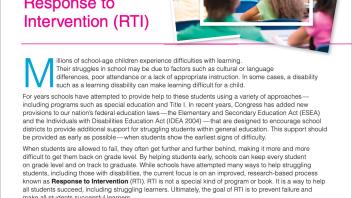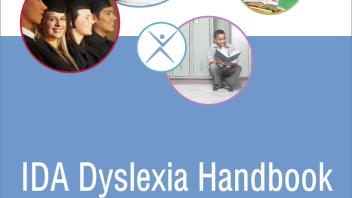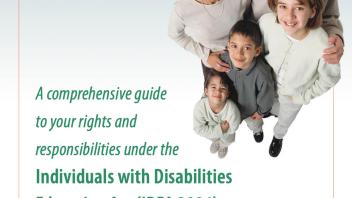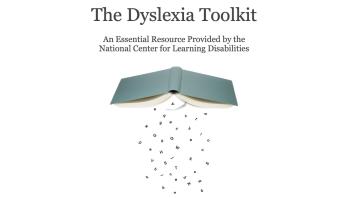Common reading problems
Does your child struggle with reading, spelling, or writing? You might wonder what kind of help is available at your child’s school. Reading problems are common, but they can have different causes and warning signs. Sometimes a problem is simple and quick to solve while others may require extensive intervention. Let’s look at some common reading issues and ways to get help for your child.
Three common reading problems
There are three common reading issues that young school-age children may exhibit.
Decoding difficulty
One type of reading problem is trouble reading printed words accurately and smoothly. This means a child has trouble decoding or sounding out words. Your child may skip, guess, or mispronounce words consistently in most texts while reading. Your child may have trouble learning sight words and have poor spelling.
Children with decoding issues have trouble identifying and using spoken sounds in words. To read a printed word, a child must have accurate and quick letter-sound knowledge and phonemic awareness. Students with decoding problems need explicit and systematic instruction to learn the alphabet, phonics and phonemic awareness. If the problem is severe and continues despite increased support, it may be a sign of dyslexia.
Reading comprehension difficulty
A second type of reading problem is specific reading-comprehension difficulty. This means a child can read words accurately and smoothly but fails to understand what was read. This is sometimes called hyperlexia. Often this problem doesn’t appear until the upper elementary grades. A child can appear to have a smooth start to reading, since the primary grades focus heavily on decoding. However, once the child moves beyond the initial skills needed to read, by 3rd or 4th grade, you may notice a slump in their reading performance as instruction shifts from learning to read to using reading to learn.
Poor comprehension is influenced by different factors, such as a lack of background knowledge, unfamiliar vocabulary, or inferential skills. Your child may have difficulty answering questions or summarizing what was read. Find out if your child’s teacher has noticed the problem. Ask the teacher to compare your child’s understanding in texts they read vs. texts read aloud.
Reading comprehension deficits are complex and may be caused by language comprehension issues. If you suspect your child has trouble with speaking or listening to language, talk to your school’s speech language pathologist to see if an evaluation and help may be warranted.
Mixed reading difficulty
The third kind of reading problem is sometimes called “garden variety poor reading” or mixed reading difficulty. This means a child has both word-reading and comprehension problems. This is the most common reading problem seen in schools. It can be caused by a combination of many factors, such as limited home experiences with literacy, English language learning, or even a learning disability. Children with decoding and language comprehension issues may have low motivation and confidence in reading and fall behind their peers if they do not receive adequate support to learn to read.
See our Target the Problem section and Portraits of Struggling Readers to learn more.
Advocating for your child
If you have concerns
If you have concerns about your child’s progress or school experience, speak up! You know your child better than anyone else. Here are some simple things you can do to be involved.
Develop a close working relationship with your child’s teachers and principal. Stay in touch between report card periods.
Save important test results. Keep class work samples, homework examples, and other school communications that show how your child usually performs.
Ask for help! If you suspect a problem, talk with your child’s teacher. If you still have concerns, talk with the principal, reading specialist, or special education teacher. You have the right to ask questions and to receive answers to the questions you ask. Also, do not hesitate to seek advice outside of the school system.
Screening. Many schools provide early screening for all children, to help identify kids at risk for reading difficulties. Screening is a key part of a process used by many schools called MTSS (Multi-Tiered System of Support) or RTI (Response to Intervention).
Evaluations and diagnostic assessments. After a child is identified as being at risk for reading difficulties, the next step is an in-depth evaluation to determine what the underlying issues are. Evaluations can be conducted at the school or by an outside professional. Learn more in this article: Preparing for an Evaluation.
Questions to ask your child’s school
- What literacy screening tools does the school use?
- When is the screening given?
- How are children with reading difficulties identified?
- What information does the school collect on a child’s literacy progress?
- How is the information used to make decisions about each child’s literacy needs?
Rick Lavoie has worked with kids with reading problems for more than 30 years. His advice to parents is to toughen up and recognize that your child needs you.
Parents sometimes worry that they’re overreacting when their child isn’t reading in first or second grade. It’s really not possible to overreact to that. The reality is you need to stand up for your child. He’s not old enough or capable at this point to advocate for himself. It’s uncomfortable sometimes, but you’ve got a right to ask questions. You’ve got a right to receive answers.
Rick Lavoie
Stay positive
Finally, foster a positive attitude towards reading. Create a comfortable and quiet reading environment by having a variety of books and materials that match your child’s interests and level. Make weekly library visits a fun and enjoyable outing. As much as you can, encourage daily reading. Praise your child’s efforts and progress. Encourage them to talk to you about what they like/dislike about reading. Keep it low-pressure — celebrate the achievements and try not to dwell too much on disappointments.
Every child has unique strengths and weaknesses. It’s no one’s fault if a child has trouble learning to read. Seek help as soon as possible and be patient and supportive along the way. With the right guidance and encouragement, most children can learn how to read!
Remember, you are not alone in this journey. There are many resources, and people who can help you and your child overcome their reading problem and achieve their full potential.
See our section on Self-Esteem and Reading Difficulties for some ways to talk with your child about their struggles with reading.
I’m worried about my child’s reading. What do I do?
Finding help
Children with reading difficulties benefit from the same thing all children benefit from — excellent reading instruction tailored to their needs. But sometimes kids who struggle need more.
Several people may be able to provide your child with extra help:
- Classroom teachers. Your child’s teacher may be able to provide more intensive instruction.
- School specialists. Specialists at your school — such as the reading specialist, speech/language pathologist, or special education teacher — may be able to provide extra assistance.
- Tutors. The school, another organization, or private tutors may be able to provide your child practice with reading or more intensive help.
- Professionals in private practice. Educational psychologists and other professionals in private practice may be able to provide an assessment, diagnosis, and/or a plan for helping your child.
- Reading clinics. University and private reading clinics may be able to provide an assessment, diagnosis, and/or a plan for helping your child.
Help from private tutors and others outside of the school may be very effective but also quite expensive. Some public school services, which are free, are only provided if a child is diagnosed with a learning disability, the most common of which is difficulty with language and reading.
If you suspect your child may have a learning disability (or ADHD), the best place to begin seeking help is your child’s school. Public schools have professionals trained to make a diagnosis. They do not charge a fee for these services.
If you disagree with the school’s diagnosis, you have the right to ask for further testing or to seek a diagnosis from a professional in private practice. Similarly, if the school does not think it necessary to assess your child, you may want to seek a diagnosis from a professional in private practice.
Remember, in order to qualify for special education services or accommodations, your child must have a diagnosis that clearly shows he or she has a learning disability that meets the criteria defined by law. In general, federal law says that a person is eligible for accommodations when a documented disability significantly interferes with a major life activity such as learning. Most states use criteria related to the discrepancy between a child’s ability and achievement. Federal laws also set clear guidelines on what special education accommodations must be provided.
The bottom line is that it’s important to know upfront what services are available from the school and how a child’s eligibility for those services is determined.
Tutoring
Sometimes kids just need an extra dose of reading help. Many schools provide tutoring support that includes one-on-one reading instruction. To make sure that your school has a high quality tutoring program, ask these questions:
- How are the tutors trained? It’s important that the tutors understand the goals and purposes of the lesson.
- What is the structure of the tutoring session? Good tutoring programs use a lesson plan that is based in the best reading research.
- How frequently will my child receive tutoring? Students should be tutored at least twice a week, for 45 to 60 minutes each time. Some students will need more.
- Are the students assessed regularly to determine progress? A reading specialist should supervise the assessment program.
- What types of materials are used during the tutoring sessions? Students should be carefully guided through books that are written at their reading level.
- Does the content of the tutoring session support my child’s classroom instruction? It should.
- Does the content address my child’s specific needs? If your child sounds out words well but struggles with vocabulary, the tutor should spend more time on word meanings than phonics.
Special education
Even with good classroom teaching and extra help, its possible that your child may continue to struggle with reading. Special education may be the answer — and it’s required by law for students who are identified as having a learning disability.
The special education process includes these steps:
1. Referral
You or your child’s teacher suspects a problem and requests an evaluation by the school.
2. Evaluation
With input from you and your child’s teacher, a team of school professionals completes a full evaluation of your child. This same team — which may include a school psychologist, a speech-language pathologist, and a reading specialist — reviews the results to determine whether your child is eligible to receive special education services.
3. Eligibility
If your child is eligible, you and the school team develop your child’s Individualized Education Plan (IEP), as required by law. Annually, or more often, you and the school review the IEP and its impact on your child’s progress.
If your child is ineligible, continue to push the school for help. If your child is not eligible but still struggles with reading, the school must figure out what will work for your child. You can also turn to private testing.
Getting your child evaluated
Not all children learn to read at the same time. But there are certain milestones that can give you an idea of how well your child is doing compared to others his or her age. If you suspect a problem, you’ll want to talk to your child’s teacher and consider having your child tested for hearing problems, learning disabilities, or any number of things that might be affecting his or her abilities.
You can request that a public school assess your child (if they do so, there is no charge). Or you can pay a licensed professional in private practice to do so. The results will inform what kinds of help a child should receive to support learning. Learn more in this article from Understood, Preparing for an Evaluation.
The assessment process can be overwhelming and confusing. The resources below will help you arm yourself with good information so you know what to expect when your child is getting tested or screened.
Learn more about how to help your child
Assessment and Evaluation
Recognizing Reading Problems
Developmental Milestones
Clues to Dyslexia from Second Grade On
Struggling Readers
Early Signs of a Reading Difficulty
Reading and the Brain
7 Things to Know About the 1 in 5 with Learning and Attention Issues
Learning Disabilities
Having Your Child Tested for Learning Disabilities Outside of School
Parent Engagement
When to Call Your Child’s Teacher
Parent Engagement
Who’s Who in Your Child’s School
Helping All Readers
Role of Speech-Language Pathologists in Reading Achievement
Launching Young Readers
Empowering Parents
Assessment and Evaluation
What to Expect From an Evaluation
RTI and MTSS
Response to Intervention (RTI): A Primer for Parents
Special Education
The IEP Team
Guides and Toolkits
A Parent’s Guide to Response to Intervention (RTI)
Guides and Toolkits
IDA Handbook: What Every Family Should Know
Guides and Toolkits
IDEA Parent Guide
Guides and Toolkits
The Dyslexia Toolkit
Additional resources we recommend
- Basics for Parents: Your Child’s Evaluation (LD OnLine)
- What Parents Can Do (Yale Dyslexia) — Links to articles and information about dyslexia for parents and educators.
- Reading-Related Skills (Yale Dyslexia) — Need help deciding if your child’s reading is on track or not? Here’s a quick and easy use to list of reading milestones for children ages 3- 9 years old.
- Learn The Law Archives (NCLD) — Provides information for parents on the federal laws that guide and protect the rights of students with disabilities in US schools




















